MIPIM 2025

Join us in Cannes to explore the exciting opportunities on the horizon and please don’t hesitate to reach out to our base for insightful discussions.


General Commentary from Executive Chairman Neil Bannon

The conversation around sustainability in the Irish commercial property sector has evolved over the last 12 months. Although everybody was aware of the significance of the challenge last year this has been brought into sharper focus as the various sources of capital in the market have set out their stall. Access to and cost of capital, both funding and equity, is clearly going to be very different for assets depending upon their sustainability credentials. This has been most evident in the office sector where deals continue to be done in new buildings with market leading green credentials both from expanding entities and those relocating form brown buildings. As investor and funders watch this they are becoming increasingly concerned about the risk of obsolescent for older stock and how the value of older buildings will have to reflect the cost of bringing them up to standard.
It is interesting and, we think, helpful to see the conversation move from an aspirational desire to become more sustainable to a clear financial motivation to protect capital. This will accelerate activity in the market as capital positions itself to ensure it is a net beneficiary. Bringing market forces to bear will help our green transition and is a welcome development.
Property Management from Directors Ray Geraghty and Alex Patterson


As custodians of a nationwide portfolio of real estate the Bannon property management team are involved in multiple projects at any moment in time where the focus is sustainability and energy conservation. There is an awareness about sustainability and ESG measures among property owners, funders, asset managers, occupiers, and service providers which is driving positive change.
In the last 12 months Bannon have been involved in some very significant sustainability projects which are now delivering much need energy savings for stakeholders. One such project was completed at Athlone Towncentre Shopping Centre (in conjunction with the SEAI) at a cost of c.€1.6 million. As a result of the project energy consumption at the shopping centre has reduced by almost 50%.
Retail Agency from Directors James Quinlan and Darren Peavoy

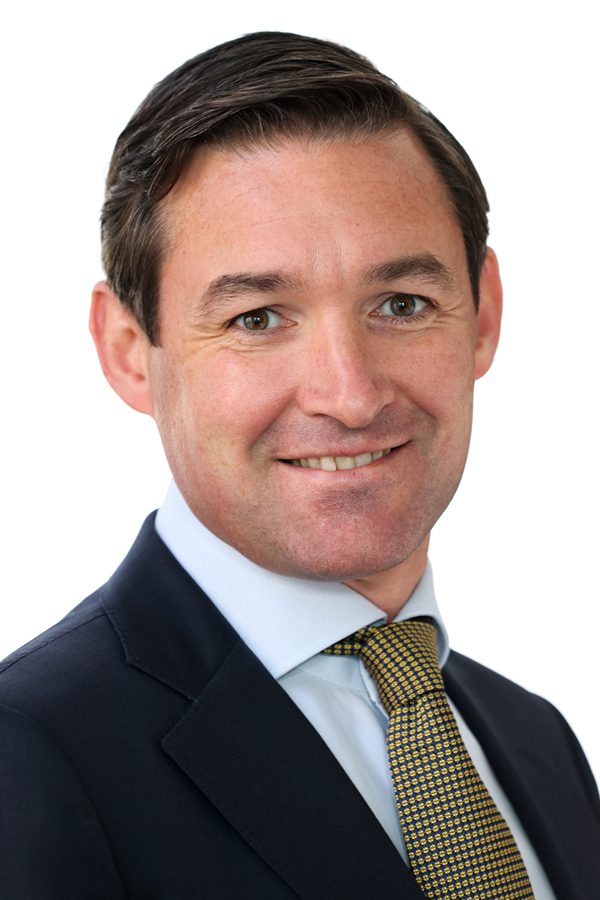

Smaller Domestic Retailers are becoming more ESG aware however have not fully embraced the concept. International and national retailers on the other hand have delivered significant ESG improvements across their portfolios with big improvements in solar generation and logistics improvements being a significant focus. Some international retailers are beginning to commit to BREEAM Good fitouts however are seeking significant assistance from owners to deliver this. Some institutional retail property owners are very focused in improving the BER status of their high street portfolios whereas shopping centre owners are very focused on improving energy usage in common areas within their schemes.
Where the ESG agenda was previously being pushed by the owners, we are seeing a shift in this from a smaller group of retailers who require owners to sign up to their ESG agenda rather than the other way round. Retailers are focused on reputation and branding, and they are utilising ESG credentials as a powerful marketing tool. This focus will begin to see a shift in the retail leasing market as it will influence building design and occupier’s expectations.
Valuations from Managing Director Paul Doyle and Director Niall Brereton
The Bannon Professional Services team continues to embrace ESG within our reporting, whilst also complying with RICS Valuation Practice Guidance Notes on ‘Sustainability and ESG in Commercial Property Valuation and Strategic Advice’. This Guidance Note requires the valuer to demonstrate how they have considered sustainability and ESG credentials in their valuation approach, calculations and commentary. This commentary is required to include a reference to potential future cost liabilities to meet regulatory and investor requirements.
In the past year or so we have noted that our building owner client has become much more aware and reactive to ESG. By example, if we are valuing a trading asset the client will most likely have responses to-hand in terms of our standard queries on the energy efficiency or otherwise of their premises. Elsewhere, if valuing an older office premises, a client will likely have a solution modelled to enhance the property’s ESG credentials. In the case of offices we continue to see a widening value gap between older/stranded buildings and those which are ‘B or better’
Investment and Office Agency from Executive Director Rod Nowlan
 Sustainability has firmly moved to the top of the investment and office leasing agenda across all size requirements. It is no longer a focus of just the larger lots sizes. Its pursuit will be a key factor in the acceleration of “the big switch” where many office occupiers are beginning to act upon what they now determine is their new office size and style requirement in a maturing blended working market. ESG is a key target in this mix. As a consequence, we are going to see a material acceleration in office obsolescence creating a huge opportunity for those with the skills to efficiently transition these buildings back to the institutional mainstream. In this regard, valuing and selling these assets will require an in-depth analysis of the true costs associated with bringing them up to standard.
Sustainability has firmly moved to the top of the investment and office leasing agenda across all size requirements. It is no longer a focus of just the larger lots sizes. Its pursuit will be a key factor in the acceleration of “the big switch” where many office occupiers are beginning to act upon what they now determine is their new office size and style requirement in a maturing blended working market. ESG is a key target in this mix. As a consequence, we are going to see a material acceleration in office obsolescence creating a huge opportunity for those with the skills to efficiently transition these buildings back to the institutional mainstream. In this regard, valuing and selling these assets will require an in-depth analysis of the true costs associated with bringing them up to standard.
Internal from Chartered Surveyor, Sustainability Manager Cillian O’Reilly

Bannon has always had sustainability in mind within the office ever since Joe Bannon himself monitored how many pages were being printed by each team member. The culmination of this was Bannon developing and implementing an ISO 14001:2015 Environmental Management System which was certified by the NSAI in 2022.
Bannon’s Carbon Footprint is relatively low at 78.7 tonnes CO2E in 2023, none the less the firm has taken steps to target and reduce its largest contributors namely electricity usage and commuting milage. Bannon has made huge strides to curate a greener and more efficient workplace and will continue to be a market leader as trends evolve.

Great food and a beautiful location, we had the pleasure of inviting our friends and connections to our annual lunch at the Gray d’Albion Beach Restaurant.
Thank you to our guests for a lovely afternoon and we look forward to coming back next year.
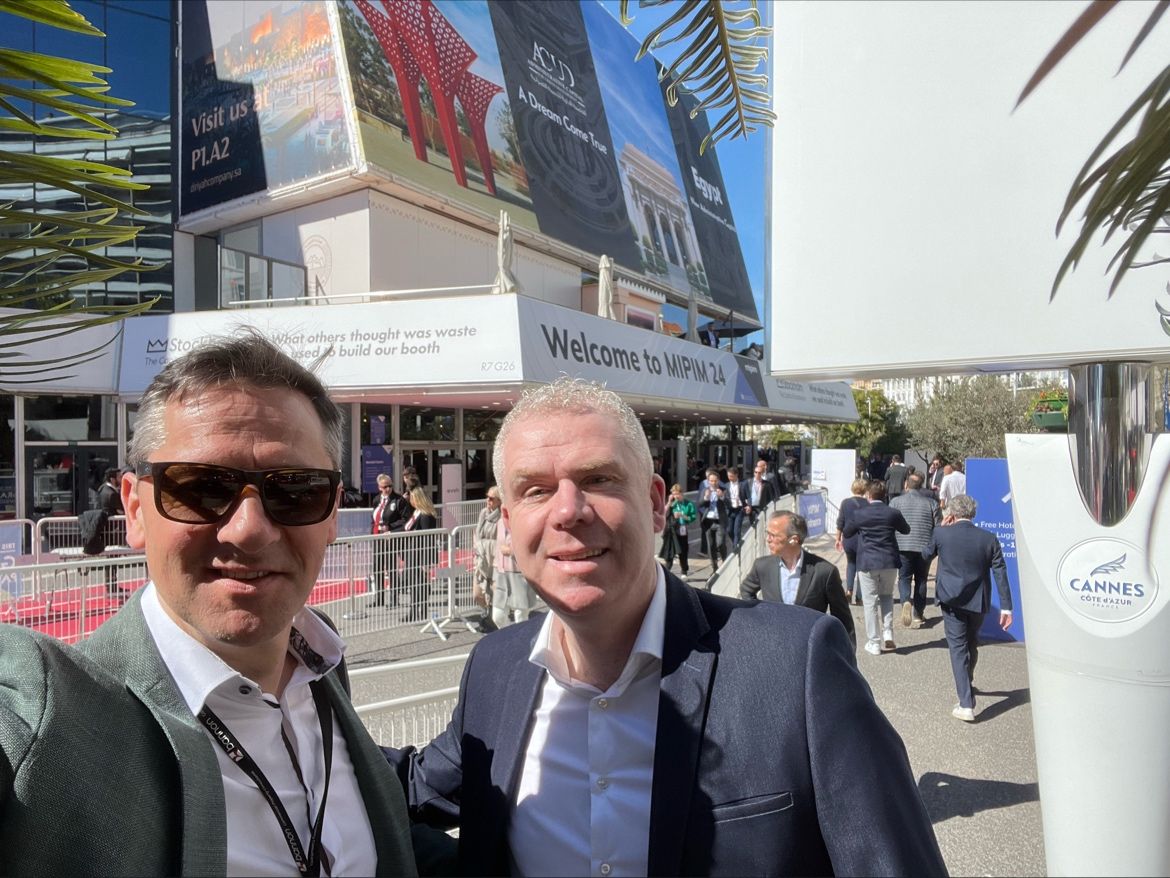
MIPIM is in full swing with Roderick Nowlan and Paul Doyle seeing huge energy for Day 2, soaking up the sunshine reconnecting with familiar faces and engaging with industry leaders.
Real Estate capital allocation for the coming 12 months has some mixed opinions. Post MIPIM summary to follow, stay tuned for more updates!

A busy morning at MAPIC for our retail team Darren Peavoy and Jennifer Mulholland, catching up with retailers and colleagues in The International Retail Network (TIRN).
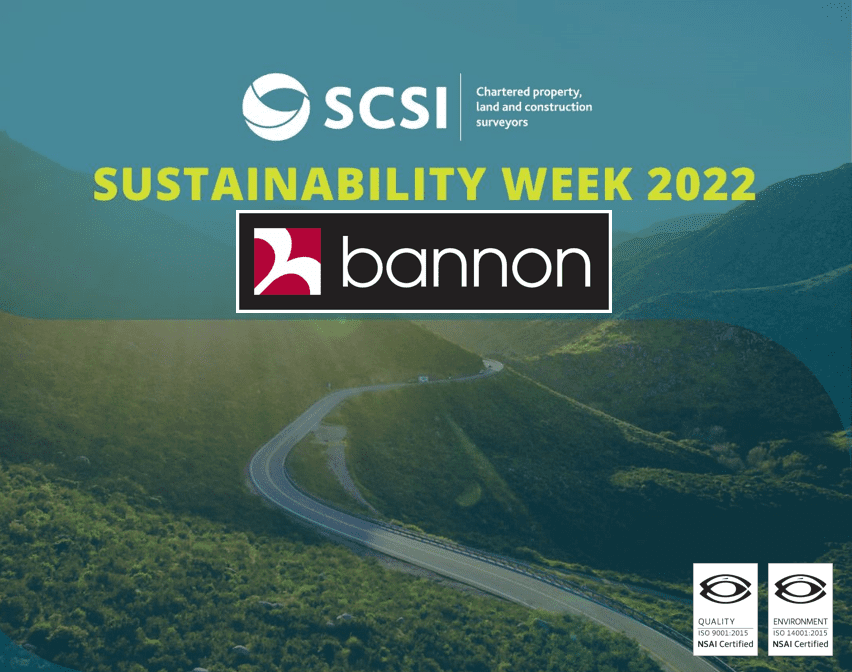
We asked our leading experts for their views on achieving a sustainable future for the Irish commercial real estate sector:
General Commentary from Executive Chairman Neil Bannon
 Sustainability impacts everybody, whether it is investors securing the long-term value of their assets, corporate occupiers demonstrating their environmental credentials to clients and staff, retailers reacting to shifts in consumer demand or funding institutions protecting the security of their loan books. There is no part of the property market that is and will not be increasingly impacted by the move to a zero-carbon future. This realisation was the reason Bannon established EVIA 3 years ago; a consultancy business whose sole focus is the delivery of sustainable solutions to stakeholders in the commercial real estate sector. Since its inception EVIA, working hand in hand with the Bannon Management, Investment and Consultancy teams, has delivered dozens of sustainability projects including LED lighting projects, smart metres and energy monitoring, solar power installation and increasingly we are seeing demand from clients to provide an overarching strategy to put their entire relationship with real estate on a long-term sustainable footing.
Sustainability impacts everybody, whether it is investors securing the long-term value of their assets, corporate occupiers demonstrating their environmental credentials to clients and staff, retailers reacting to shifts in consumer demand or funding institutions protecting the security of their loan books. There is no part of the property market that is and will not be increasingly impacted by the move to a zero-carbon future. This realisation was the reason Bannon established EVIA 3 years ago; a consultancy business whose sole focus is the delivery of sustainable solutions to stakeholders in the commercial real estate sector. Since its inception EVIA, working hand in hand with the Bannon Management, Investment and Consultancy teams, has delivered dozens of sustainability projects including LED lighting projects, smart metres and energy monitoring, solar power installation and increasingly we are seeing demand from clients to provide an overarching strategy to put their entire relationship with real estate on a long-term sustainable footing.
The route to sustainability is both challenging and exciting. It can be costly and yet the alternative is much more expensive for stakeholders in the industry. By pursuing a sustainable strategy that coordinates zero-carbon delivery with valuation and asset management expertise, the journey can be efficient and ultimately profitable.
Retail from Directors James Quinlan and Darren Peavoy

 Institutional owners have very much embraced the ESG agenda, retailers have been slower to embrace from a property occupancy perspective, but this is changing. There is a trend in Institutional owners delivering ESG improvements via refurbishment works in advance of new lettings in prime high street locations. We are now seeing this being followed by some of the major international brands that are taking leases on these properties where they are committing to BREEAM GOOD (and higher) fitouts. Retailers have been proactive in retrofitting energy efficient initiatives including new LED lighting to reduce energy usage and benefit from reduced air conditioning requirements due to the reduced heat generation.
Institutional owners have very much embraced the ESG agenda, retailers have been slower to embrace from a property occupancy perspective, but this is changing. There is a trend in Institutional owners delivering ESG improvements via refurbishment works in advance of new lettings in prime high street locations. We are now seeing this being followed by some of the major international brands that are taking leases on these properties where they are committing to BREEAM GOOD (and higher) fitouts. Retailers have been proactive in retrofitting energy efficient initiatives including new LED lighting to reduce energy usage and benefit from reduced air conditioning requirements due to the reduced heat generation.
Valuations from Managing Director Paul Doyle and Director Niall Brereton

 The Bannon Professional Services team actively embraces and adheres to the latest RICS Valuation Practice Guidance Note titled ‘Sustainability and ESG in Commercial Property Valuation and Strategic Advice’ when undertaking valuation instructions. This Guidance Note requires the valuer to demonstrate how they have considered sustainability and ESG credentials in their valuation approach, calculations and commentary. It may be necessary, depending on the nature of the instruction, for the valuer to seek specialist investigations by a third party advising as to the ability and estimated cost to bring an asset up to modern standards. Valuing assets of this nature requires an in-depth analysis of the true costs associated with bringing them up to standard.
The Bannon Professional Services team actively embraces and adheres to the latest RICS Valuation Practice Guidance Note titled ‘Sustainability and ESG in Commercial Property Valuation and Strategic Advice’ when undertaking valuation instructions. This Guidance Note requires the valuer to demonstrate how they have considered sustainability and ESG credentials in their valuation approach, calculations and commentary. It may be necessary, depending on the nature of the instruction, for the valuer to seek specialist investigations by a third party advising as to the ability and estimated cost to bring an asset up to modern standards. Valuing assets of this nature requires an in-depth analysis of the true costs associated with bringing them up to standard.
Property Management from Director Ray Geraghty
 Sustainability is a key focus of the Bannon Property Management team. The extent of our portfolio (150 assets) gives Bannon a unique position in the Irish marketplace to be leaders of change. At present there are a variety of ongoing projects across the portfolio which are focused on reducing energy consumption, reducing water consumption and reducing waste.
Sustainability is a key focus of the Bannon Property Management team. The extent of our portfolio (150 assets) gives Bannon a unique position in the Irish marketplace to be leaders of change. At present there are a variety of ongoing projects across the portfolio which are focused on reducing energy consumption, reducing water consumption and reducing waste.
Office from Divisional Director Lucy Connolly
 Sustainability in terms of office design and construction has become a fundamental and determining factor for companies when acquiring office space. With corporate ESG agendas now firmly in place, what was once a consideration, is now a key component in the acquisition process, which in turn is leading to increased demand for prime grade A office accommodation.
Sustainability in terms of office design and construction has become a fundamental and determining factor for companies when acquiring office space. With corporate ESG agendas now firmly in place, what was once a consideration, is now a key component in the acquisition process, which in turn is leading to increased demand for prime grade A office accommodation.
Investment from Executive Director Rod Nowlan
 ESG has permeated every aspect of real estate, but in many ways has been led by the Capital Markets sector. Well before the adoption in April 2021 of EU’s Sustainable Finance Directive, major real estate players were readying themselves for the impact of ESG in terms of putting in place procedures for collating information and assessing and adjusting their assets and portfolios. These institutions have either been acquiring or developing compliant assets while simultaneously selling assets which would fall foul of ESG regulations. Most smaller fund managers and private offices have now followed suite. Now that ESG goes to the heart of any asset due diligence, non-complaint assets have a difficult future ahead of them! There will however be huge opportunity for those with the skills to efficiently transition these buildings back to the institutional mainstream. In this regard, valuing and selling these assets will require an in-depth analysis of the true costs associated with bringing them up to standard.
ESG has permeated every aspect of real estate, but in many ways has been led by the Capital Markets sector. Well before the adoption in April 2021 of EU’s Sustainable Finance Directive, major real estate players were readying themselves for the impact of ESG in terms of putting in place procedures for collating information and assessing and adjusting their assets and portfolios. These institutions have either been acquiring or developing compliant assets while simultaneously selling assets which would fall foul of ESG regulations. Most smaller fund managers and private offices have now followed suite. Now that ESG goes to the heart of any asset due diligence, non-complaint assets have a difficult future ahead of them! There will however be huge opportunity for those with the skills to efficiently transition these buildings back to the institutional mainstream. In this regard, valuing and selling these assets will require an in-depth analysis of the true costs associated with bringing them up to standard.
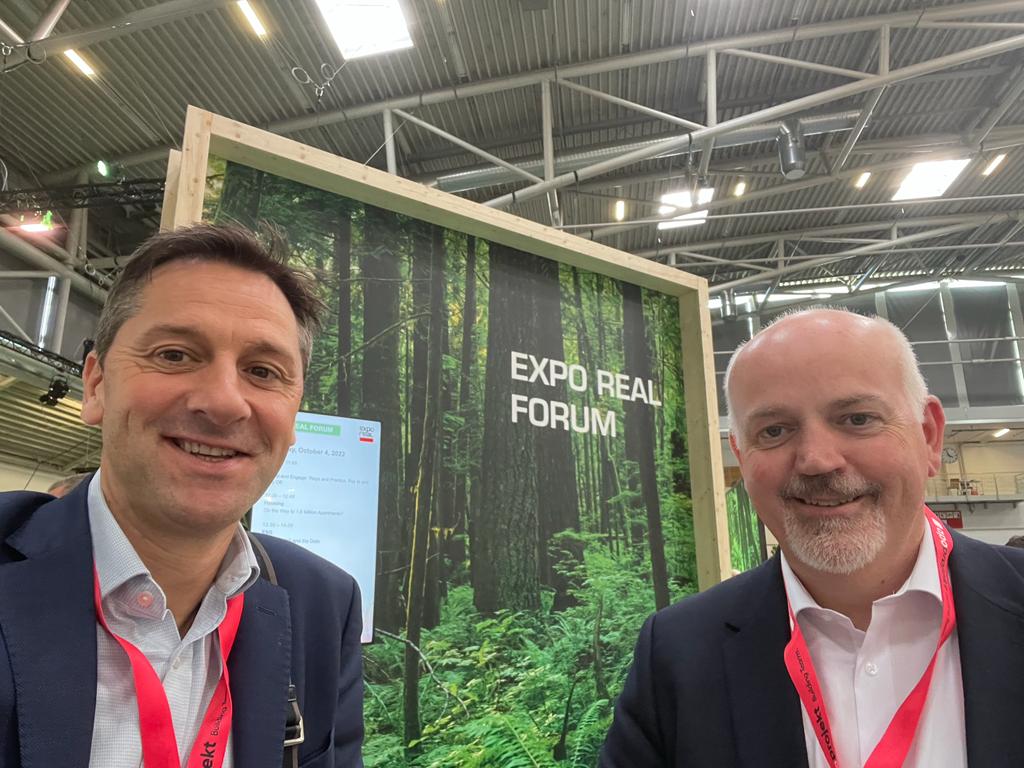
Neil Bannon and Roderick Nowlan back on the conference circuit again. Great to be back at EXPO REAL (Messe München) and we look forward to seeing you there!

Great to get back to Munich again for EXPO REAL (Messe München) (4-6th Oct).
Get in touch for a chat with Neil Bannon and Roderick Nowlan on Irish Real Estate Opportunities and the impact of ESG on the Irish market.
 Following the government’s transposition of IORP II, any new One Member Arrangements (OMA) will now be largely prevented from borrowing for their investments and be required to hold at least 50% of their investment in regulated markets e.g. listed shared and/or bonds.
Following the government’s transposition of IORP II, any new One Member Arrangements (OMA) will now be largely prevented from borrowing for their investments and be required to hold at least 50% of their investment in regulated markets e.g. listed shared and/or bonds.
Commercial properties had been an attractive option for OMA pension funds which could buy a €2.0m property with a €1.0m pension pot and borrowings. The income could be applied to the loan to allow the pension to grow to the €2.0m cap without relying upon growth. The combination of restricting borrowings and the 50% cap has the nett effect of limiting property purchases to €0.5m largely ruling out directly held commercial real estate.
Happy to discuss the implications and opportunities further.
#bannon #bannonconsultancy #bannonresearch
The challenge of creating innovative housing solutions was on the agenda at the most recent meeting of the Donegal Dublin Business Network (DDBN) as Eoghan Murphy TD, Minister for Housing, Planning and Local Government, addressed the organisation.
A panel discussion on the subject of housing took place at the group’s April gathering in Iveagh House on St Stephen’s Green, followed by a Q&A session overseen by DDBN chairman Paul Doyle (MD of Bannon Commercial Property Consultants) and committee member Danielle Conaghan (Partner in Arthur Cox). Minister Murphy was joined on stage at the event by two other guests of the network. Margaret Sweeney, a native of Kilcar, is CEO of IRES REIT Plc – a company that is Ireland’s largest private landlord with more than 2,500 units.The third industry expert present was Richard Barrett, founder of Bartra Capital Property, a development and investment platform active in areas including private residential development, social housing, nursing homes, commercial real estate and renewable energy. Bartra recently acquired a holiday resort with 27 homes on 186 acres of land in Carrigart.
Making his introductions, Chairman Paul Doyle acknowledged the high calibre of speaker who had joined group members to discuss a topic that has dominated political and social debate in recent years. An open and informative discussion lasting almost 90 minutes followed and the topics debated included the cost of housing delivery, affordability and access to funding.
The key role of the National Development Plan and Project Ireland 2040 were referenced throughout the debate in terms of how they aim to attract a more even spread of national investment into regions including the north west, where Letterkenny has been identified as a centre for regional growth. One interesting idea advanced towards the end of the evening involved embracing affordable opportunities for converting commercial premises in town and village centres that have been left vacant for many years into residential housing, thereby reintroducing a soul back into towns and villages in regional areas.
Wrapping up the event, Danielle Conaghan acknowledged and thanked the panel for their openness, and observed that a fast fix to the current housing situation was not going to be easy. She added that it was encouraging to be advised that the private sector was now embracing government policy and opportunities to stimulate a more rapid supply of housing.
Article published in the Donegal Dublin Business Network

In the year to February, residential property prices at national level increased by 13.0%. This compares with an increase of 12.0% in the year to January and an increase of 9.7% in the twelve months to February 2017.
In Dublin, residential property prices increased by 12.7% in the year to February. Dublin house prices increased 12.3%. Apartments in Dublin increased 14.5% in the same period. The highest house price growth was in Dublin City, at 14.2%. In contrast, the lowest growth was in Dun Laoghaire-Rathdown, where house prices increased 9.6%.
Residential property prices in the Rest of Ireland (i.e. excluding Dublin) were 13.3% higher in the year to February. House prices in the Rest of Ireland increased 13.1% over the period. The Midland region showed the greatest price growth, with house prices increasing 14.8%. The South-East region showed the least price growth, with house prices increasing 8.6%. Apartment prices in the Rest of Ireland increased 14.6% in the same period.
Overall Decline
Overall, the national index is 21.8% lower than its highest level in 2007. Dublin residential property prices are 23.0% lower than their February 2007 peak, while residential property prices in the Rest of Ireland are 27.5% lower than their May 2007 peak.
Recovery
From the trough in early 2013, prices nationally have increased by 74.6%. Dublin residential property prices have increased 90.6% from their February 2012 low, whilst residential property prices in the Rest of Ireland are 66.7% higher than the trough, which was in May 2013.
In the year to November, residential property prices at national level increased by 11.6%. This compares with an increase of 11.8% in the year to October and an increase of 9.2% in the twelve months to November 2016.
In Dublin, residential property prices increased by 11.3% in the year to November. Dublin house prices increased 11.5%. Apartments in Dublin increased 11.8% in the same period. The highest house price growth was in Dublin City, at 13.3%. In contrast, the lowest growth was in Dun Laoghaire-Rathdown, with house prices rising 10.8%.
Residential property prices in the Rest of Ireland (i.e. excluding Dublin) were 11.7% higher in the year to November. House prices in the Rest of Ireland increased 11.6% over the period. The West region showed the greatest price growth, with house prices increasing 16.0%. The Mid-West region showed the least price growth, with house prices increasing 8.9%. Apartment prices in the Rest of Ireland increased 13.2% in the same period.
Overall Decline
Overall, the national index is 23.1% lower than its highest level in 2007. Dublin residential property prices are 24.1% lower than their February 2007 peak, while residential property prices in the Rest of Ireland are 29.2% lower than their May 2007 peak.
Recovery
From the trough in early 2013, prices nationally have increased by 71.6%. Dublin residential property prices have increased 88.1% from their February 2012 low, whilst residential property prices in the Rest of Ireland are 62.8% higher than the trough, which was in May 2013.
CSO reports
In the year to June, residential property prices at national level increased by 11.6%. This compares with an increase of 11.1% in the year to May and an increase of 5.5% in the twelve months to June 2016.
In Dublin, residential property prices increased by 11.1% in the year to June. Dublin house prices increased 11.2%. Whereas apartments increased 10.6% in the same period. The highest house price growth was in South Dublin, at 11.8%. In contrast, the lowest growth was in Fingal, with house prices rising 5.4%.
Residential property prices in the Rest of Ireland (i.e. excluding Dublin) were 11.8% higher in the year to June. House prices in the Rest of Ireland increased 11.8% over the period. The South-East region showed the greatest price growth, with house prices increasing 16.7%. The Mid-West region showed the least price growth, with house prices increasing 8.4%. Apartment prices in the Rest of Ireland increased 13.4% in the same period.
Overall Decline
Overall, the national index is 29.0% lower than its highest level in 2007. Dublin residential property prices are 29.9% lower than their February 2007 peak, while residential property prices in the Rest of Ireland are 34.6% lower than their May 2007 peak.
Recovery
From the trough in early 2013, prices nationally have increased by 58.4%. In the same period, Dublin residential property prices have increased 73.8% whilst residential property prices in the Rest of Ireland are 50.4% higher.
The rental market has, for over five years now, shown increasing signs of distress, with stronger demand but weaker supply each year. Market rents in Dublin, for example, are now 66% higher than at their lowest point. Outside Dublin, rents have risen 41%. A key part of the political reaction has been the introduction of Rent Pressure Zones.
This measure sits on top of existing measures, which limit the frequency with which landlords can increase rents. To be designated a Rent Pressure Zone for three years, rents in an area must increase by 7% or more annually for the majority of the last 18 months. Once a Rent Pressure Zone, rents can only increase by 4% per year.
The principal aim of RPZ’s is to protect sitting tenants from significant rent increases. While the measure is based on rents registered with the Residential Tenancies Bureau, trends in the RTB and Daft.ie are highly correlated, albeit with a slight lag in the RTB figures. If Daft.ie figures were used to calculate Rent Pressure Zones, 47 of the 54 markets covered in the report would currently be RPZ’s.
What is common to both Daft.ie and RTB measures is that they use the rent at the start of the lease – in the case of Daft.ie, it’s the listed rent, while in the case of the RTB, it’s the rent on the formal lease lodged with the bureau.
In a market where most leases lasted just one year, this kind of measure captures trends in the full rented sector well. However, if people choose not to move as regularly, it is better to think of the rented sector as divided into two categories: “movers” and “stayers”. And one of the main reasons people choose not to move regularly is if rents are rising rapidly. Therefore, the RPZ measure could be mixing things up: using trends rents paid by movers (“market rents”) to control rents paid by stayers (“sitting rents”).
Daft.ie surveyed over 4,000 tenants, asking them details about the path of rents they have paid in recent years. What we were interested in was examining the extent to which landlords have passed on rent increases faced by movers to sitting tenants. In other words, have “sitting rents” followed the same trend as “market rents”?
Since 2013, market rents nationally have risen by just over 50%. However, sitting rents have increased by just 27%. In other words, those who have stayed in the same lease have enjoyed a discount relative to market rents, with rents increasing by just half the increase seen on the market.
The implications for the system of Rent Pressure Zones are obvious. In order to control sitting rents, sitting rents themselves must be measured. It is not helpful to rely on market rents in a rented sector where now the typical lease lasts over three years.
The survey undertaken for this Daft.ie Rental Report suggests that for many – although by no means all – sitting tenants, there has been no dramatic increase in rents. This may mean that the Rent Pressure Zone system makes things worse, rather than better, by amplifying the insider-outside nature of the rented sector.
Sitting tenants now enjoy not only a discount relative to the market rent, but also protection of that lower rent into the future. Meanwhile, movers in the private rented sector face not only far higher rents but almost no availability in the market. In such a market, it would be a brave prospective tenant who would ask the landlord to see proof that the rent they would pay is only 4% higher than a year previously!
The message from the rental market to policymakers is the same as it has been for over five years now: more supply is needed. Until policymakers understand why it costs so much to build a two-bedroom apartment here, compared to anywhere else in Europe, that’s unlikely to happen.
More than 800 sites owned by local authorities and public bodies will be offered to the private market to help boost housing supply.
Land banks totalling 2,000 hectares and controlled by city and county councils and other bodies including CIÉ, the IDA and HSE, are to be offered to private developers and housing associations in an effort to resolve the housing crisis and provide at least 50,000 new homes.
Four in Dublin alone are capable of providing 3,000 homes, including at least 1,000 social units.
Expressions of interest from developers will be sought over the coming days.
The Department of Housing has also identified 30 sites owned by public bodies in the main cities of Dublin, Galway, Cork, Limerick and Waterford totalling around 200 hectares, another 73 controlled by the Housing Agency of 250 hectares and a massive 1,500 hectare land bank comprising 700 sites controlled by city and county councils.
They include 18 hectares near Galway Port, the Central Mental Hospital in Dundrum, Department of Defence lands in Mullingar and more than two hectares at Connolly Station in Dublin.
Others are as small as one-10th of a hectare and could be used for co-operative housing.
The Irish Independent has learned that developers will be invited to build homes under a licensing arrangement where land could be sold, provided for free, subject to a long-term lease or arrangement where the land cost is repaid after units are sold.
Sources said the State would have to achieve a return for offering the lands, such as provision of new social homes.
Appraisals of each site will be completed prior to the lands being offered, to set out the maximum number of units possible.
The housing minister is putting it up to local authorities and other public bodies to deliver homes on State lands. “This is gigantic in scale, and a once in 100 years opportunity to get it right.”
Local authorities will be free to dictate the number of homes for each site, and mix of tenure types. They could also set upper price limits for starter homes or other units, and oblige developers to provide affordable rental, private rental or housing for the elderly.
Developments on local authority lands will also benefit from a fast-track planning process. The details will be revealed by Housing Minister Simon Coveney today at the launch of a new Housing Land Map, which sets out residentially owned lands and those in control of public bodies, which is suitable for housing.
In the year to February, residential property prices at national level increased by 10.7%. This compares with an increase of 8.1% in the year to January and an increase of 5.4% in the twelve months to February 2016.
In Dublin, residential property prices increased by 8.3% in the year to February. Dublin house prices increased 8.1%. Whereas apartments increased 9.1% in the same period. The highest house price growth was in Dublin City, at 9.2%. In contrast, the lowest growth was in Fingal, with house prices rising just 3.7%.
Residential property prices in the Rest of Ireland (i.e. excluding Dublin) were 13.2% higher in the year to February. House prices in the Rest of Ireland increased 13.1% over the period. The West region showed the greatest price growth, with house prices increasing 19.8%. In contrast, the Mid-East region showed the least price growth, with house prices increasing 9.3%. Apartment prices in the Rest of Ireland increased 13.9% in the same period.
Overall Decline
Overall, the national index is 30.7% lower than its highest level in 2007. Dublin residential property prices are 31.3% lower than their February 2007 peak, while residential property prices in the Rest of Ireland are 35.7% lower than their May 2007 peak.
Recovery
From the trough in early 2013, prices nationally have increased by 52.1%. In the same period, Dublin residential property prices have increased 67.9% whilst residential property prices in the Rest of Ireland are 47.9% higher.
Political uncertainty may have been the backdrop to MIPIM this week but the real estate industry has remained positive, recognising the long-term importance of globalisation, diversification and the key megatrends shaping society.
That was the message from Michael Keogh, associate director of research and strategy at TH Real Estate, as he delivered his keynote presentation at MIPIM’s wrap-up conference session.
Keogh told delegates: “Urbanisation and connectivity together will probably be one of the biggest and most powerful factors in shaping the 21st century and the markets we move in. The key challenge lies in identifying the growth cities and the migration of capital but it’s an opportunity too.”
Keogh picked up on another important theme of the week – the merging of real estate with sectors such as infrastructure into real assets generally, even if it means investors and fund managers such as TH Real Estate “lowering our return expectations”.
Not unconnected to the real assets movement is the idea of diversification, which has been a “real buzzword” at MIPIM this week, given the fact that there is more and more capital going to fewer and fewer markets.
Keogh also highlighted the importance of technology, not only as a disruptive force but in routine real estate work. “You can’t ignore it. You have to embrace it,” he said.
In many respects MIPIM has reflected the growing importance and use of technology in real estate. At the same conference session — which was moderated by Barnes Media International’s Richard Barnes — Fillippo Rean, real estate division director of Reed MIDEM, described the remarkable growth of MIPIM’s Innovation Forum, from the mixed reception when it was introduced several years ago to its position today as an integral part of the show.
As Rean said, the growing success of the Innovation Forum has reflected the industry’s growing acceptance of technology and societal change, as well as the “changing views and conceptions of built assets”.
“The thinking about property occupation and ownership of assets is changing,” Rean said. “The relationship with the assets is changing – how can we maximise the utilisation of the assets and ensure that they don’t become obsolete?
“Real estate will always be about financial transactions, and buying and selling properties – that’s the core of the activity. But we have this innovation all around us and it is happening in an accelerating way.”
MIPIM and TH Real Estate will publish a white paper next month, outlining some of these themes and issues. It will be a timely analysis of the forces at work in global real estate.
As Keogh observed, the industry is grappling not just with fast-changing technology, but short-term movements in investment markets. “You can move in and out of markets and you may have missed some opportunities but you should try and look beyond short term horizons and stick to your business plans,” he said.
Finding the correct balance between short-term considerations and long term returns is the challenge for the industry – and very much a theme of MIPIM during the week.
The CSO launched a new Residential Property Price Index (RPPI) for Ireland. The new model incorporates significant methodological improvements and will replace the existing series. The original model was based on mortgage data from credit institutions and, as such, its coverage of the market was less complete. For example, between 2011 and 2015, about half of household property transactions were funded by a mortgage; the percentage was as low as 44.4% in 2013. The new model records sale prices based on Stamp Duty returns (the same data source as the Residential Property Price Register), which means it will now cover all market purchases, both cash and mortgage-based. This will provide a clearer and more accurate picture of real property price growth than is available through mortgage data alone.
Eircode routing keys are used in the new index to better account for locational differences between dwellings meaning that while prices were previously broken down into three categories (Dublin, National, National Excluding Dublin), there are now four new house price indices in the Dublin Region (Dublin City, Dun Laoghaire Rathdown, Fingal, South Dublin) and seven in the rest of Ireland (Border, Midland, West, Mid-East, Mid-West, South-East, South-West).
Key findings:
Report by the Central Statistics Office
The latest Daft.ie Rental Report released this morning shows rents have now surpassed Celtic Tiger levels to reach their highest level on record, with the average rent nationwide up 11% year-on-year to reach €1,037 per month in Q2.
The report shows;
Reported by Daft.ie
Residential rents increased by 9% over the course of last year, this compares to an increase of 10.7% reported in 2014, according to the latest quarterly report from property www.daft.ie.
The average monthly rent being paid between October and December of 2015 was €979, compared to €898 over the same period a year previously.
At the end of last year the average rent was close to €1,000, with values up 9% nationally.
Rent increases were higher in regional cities, with Cork seeing them jump by more than 15%.
Year-on-year change in rents – major cities, Q4 2015
| Dublin | €1,435 | up 8.2% |
| Cork | €978 | up 15.4% |
| Galway | €887 | up 13.3% |
| Limerick | €778 | up 12.4% |
| Waterford | €673 | up 10.3% |
The latest PwC Urban Land Institute Emerging Trends in Real Estate Europe 2016 report, published today (13 January), reveals that Dublin is attracting strong capital investment which is driving demand for new property. Dublin is ranked third after Berlin and Hamburg for real estate investment, and sixth for development.
Sentiment remains very positive for Dublin, with real demand coming from overseas companies. Distressed bargains are no longer seen as the attraction here, it is rental growth restarting in a market where little new stock has been created. The report predicts that value growth will soon reach its peak – respondents expect rental growth in Dublin offices, however they expect the real pickup in terms of total return to be for those who have already invested or will invest in the very near term. Further value enhancement will be driven by rental growth, however office space shortages are forecast to continue for several years.
The consensus among respondents is that Dublin has already reached its peak for opportunistic returns. Higher returns can still be found but they are “in the development space or buying land or buying debt”. “The office recovery is well underway and the retail recovery is just starting. Retailers who have sat on their hands are out looking at the best pitches again.”
The report shines a spotlight on fundamental changes at the business end of the real estate industry. It reveals an industry trying to come to terms with the needs of occupiers and the disruptive forces of technology, demographics, social change and rapid urbanisation.
Key findings:
The vast majority of respondents are confident in their ability to thrive in 2016. However, they acknowledge it is an increasingly competitive global field for real estate. They are aware that if the wall of capital recedes, European markets could be left exposed. Then it will be the strength of the underlying market fundamentals and management’s operational skills that come into focus.
For the most innovative, forward-looking businesses in real estate, the concept of landlord and tenant is fast becoming outdated: tenants are now consumers of real estate. The clear challenge to the industry is to be less about bricks and mortar and more about service. Two thirds of respondents agree that occupiers are demanding shorter leases.
“20 years ago we had tenants, now we have customers, in 20 years’ time we will have guests.” – European REIT CEO
Commercial vacancy rates across the State have decreased marginally, according to new research published today.
The total number of occupied commercial premises in Ireland increased throughout 2015 from 194,642 in the last quarter of 2014 to 195,803 in the last quarter of 2015.
It represents a decrease of 0.2% from 12.8% to 12.6%.
The research is from the Q4 2015 edition of GeoView which is published twice a year. It is the third annual review of commercial vacancy rates in the State.
There were 16 counties that recorded a decrease in commercial vacancy rates between the fourth quarter of 2014 and the fourth quarter of 2015.
Kerry recorded the lowest commercial vacancy rate of any county at 9.2%, while Sligo recorded the highest at 16.4%. Both counties held the same rankings in the fourth quarter of 2014.
The review said a number of counties in Connaught and Ulster have yet to recover and are still showing increases in vacancy rates.
The average commercial vacancy rate in Ulster increased from 12.5% in the last quarter of 2014 to 12.7% in the last quarter of 2015, while the vacancy rate in Connacht went from 14.7% to 14.8% over the same period.
Both Munster (11.9%) and Leinster (12.4%) saw a decrease of 0.2 percentage points each. Leinster’s commercial vacancy rate was unchanged with just two counties, Wexford (10.1%) and Wicklow (12.5%), recording increases over the year.
The data was published by GeoDirectory which was jointly established by An Post and Ordnance Survey Ireland (OSi) to create and manage Ireland’s only complete database of commercial and residential buildings.
The largest percentage point increase was seen in Leitrim where the vacancy rate increased by 0.6% to 16.1%. Conversely, the largest decrease was seen in Carlow where the vacancy rate fell by 1.2% to 11.9%.
At 49,809, Dublin had the largest number of unique commercial address points followed by Cork (25,627) and Galway (12,877).
In 2015, Leitrim, Longford and Carlow had the lowest number of commercial address points with less than 3,000 units in each county, as was the case throughout 2013 and 2014.
GeoDirectory chief executive Dara Keogh said the trends throughout 2013 and 2014 “seem to have shifted”.
Article in the Irish Times
The National Asset Management Agency (NAMA) has announced details of a major funding programme that aims to deliver almost 4 million square feet of new commercial space in Dublin Docklands and 20,000 new homes in Dublin and other areas of strong demand. The residential programme will require total funding of €5.6 billion with peak funding expected to be €1.8 billion – the proceeds from the sale of completed projects will be recycled to fund new commercially viable projects. The Docklands development programme will require total funding of €1.9 billion with peak funding up to €500m.
In an effort to de-risk these programmes and to maximise the contribution of the alternative funding, development and construction sectors, NAMA will look for JV partners interested in the co-funding and construction of projects. With that in mind, NAMA will formally seek, in January 2016, ‘expressions of interest’ from potential partners for its residential delivery programme.
In line with NAMA’s obligations under Section 10 of the NAMA Act, all projects will be required to pass a stringent commercial viability threshold before NAMA approves funding. The Agency will explore appropriate financing options for each site to establish the best financing mechanism specific to each. These options include NAMA funding all of the construction work required; co-funding with other lenders; or establishing project-specific joint ventures with major investment or construction groups. NAMA will also work with non-NAMA building platforms.
The funding programme is expected to generate up to 30,000 jobs when construction is at its peak and deliver commercial space equivalent to approximately double the original IFSC.
NAMA is confident that the new programmes will not affect its plan to redeem all of its senior debt by 2018 and its subordinated debt by 2020. Current projections indeed indicate that the programmes are likely to increase NAMA’s projected terminal surplus (currently estimated at up to €1.75bn) which will be transferred to the Exchequer when NAMA completes its work.
The announcement was made today at the formal launch of NAMA’s funding programme in Dublin, which was attended by Minister for Finance Michael Noonan TD and Minister for Public Expenditure and Reform Brendan Howlin TD, and hosted by NAMA Chairman Frank Daly and NAMA Chief Executive Brendan McDonagh.
The announcement provides detailed information on some of the projects that are included in the two programmes.
Key features of Dublin Docklands SDZ programme:
Strong performance in Ireland’s commercial property market has continued throughout 2015, albeit at a slightly slower pace than was seen last year. According to the latest results of the IPD/SCSI Ireland Quarterly Property Index, total returns from Irish investment property grew 6.1% in the quarter to September 2015, down slightly from the 6.7% recorded in Q2.
The latest data show that in the 12 months to the end of September 2015, total returns for Irish commercial property were up 28.5%, which is almost double the 15.3% figure recorded in the UK for the same period. Q3 returns were notably more balanced across Irish property types, with retail, office and industrial sectors recording quarterly growth of 5.8%, 6.4% and 4.8% respectively.
Offices continued to lead the market in Q3 as capital values increased by a further 5.2% meaning that they are now just over 40% off the 2007 peak, compared to 65% two years ago. This growth has been driven by a strong rental growth as positive economic performance in recent years has led to increased demand for office space and supply shortages prevail in many areas. Rental values for office properties increased by 3.8% in Q3 or 23.1% year-on-year, far outperforming 12-month rental growth for both retail and industrial properties of 4.1% and 6.4% respectively.
Mr McDonagh also outlined six potential challenges that Nama faces in shifting its remaining €11.1 billion of assets in Ireland. These are: keeping bidders interested in the Irish property story; competition from secondary trading of assets in off-market deals by private equity funds; competition from other European markets that may become “increasingly attractive as Irish property yields decline towards an average 5%”: economic and timing risks; staff retention; and development risk.
‘Very successful’ 2014
Mr McDonagh’s presentation, which is dated April 1st, stated that Nama had a “very successful” 2014. He said the agency had collected €25 billion in cash from loans since its inception five years ago.
In January, Nama said it had collected €23.7 billion in disposal receipts, so Mr McDonagh’s latest presentation suggests that some €1.3 billion in cash was generated by Nama in the first three months of this year.
Of the €11.1 billion remaining in Nama’s Irish portfolio, some €7.7 billion was located in Dublin, €917 million in Cork, €526 million in Galway and €498 million in Kildare. At the other end of the scale, just €5 million was located in Longford, €8 million in Monaghan and €10 million in Leitrim.
The presentation noted that Nama had provided rent abatements worth an annual €20 million to small and medium enterprises and “long-term reliefs” of more than €40 million. Some 15,000 jobs at trading businesses in Ireland are linked to loans with the agency.
Liability
Mr McDonagh also told investors that Ireland’s contingent liability arising from Nama and Irish Bank Resolution Corporation (IBRC) has been reduced from €43 billion at the time of IBRC’s liquidation in February 2013 to €12.6 billion currently.
He said Nama was “firmly on course” to repay all of its €30.2 billion in senior debt by the end of 2018 and “recover all carrying costs, and working and development capital advances to debtors”. At least 80% of its senior debt – €24 billion – is due to be paid down by the end of 2016.
Mr McDonagh reminded investors of the scale of Nama’s work since its inception. It acquired €74 billion worth of par-value loans from Irish banks, relating to 780 debtors, more than 5,000 “borrowing entities” and 60,000 “property units”. Nama was originally due to wind up by 2020.
See more at www.irishtimes.com
Lone Star, which last week bought the Jurys Inn hotel chain for €910m, is refinancing a series of properties from the Project Holly portfolio, which was bought from NAMA a year ago, and is seeking up to €400m in a five-year term senior or whole loan.
Eastdil Secured has been appointed to refinance several major assets within the portfolio as part of a wider portfolio including Dublin offices acquired from IBRC, AIB and the 75 St Stephen’s Green loan acquired from RBS back in December 2013.
Eastdil Secured is understood to be already in discussions with prospective investment banks and insurance lenders.
Major assets in Project Holly include:
NAMA has issued their end-year summary of progress made in 2014 and on a number of its key objectives and targets:
NAMA has sold €18.7bn in loan and assets sales with €7.8bn sold last year alone, its end-of-year summary shows.
In the year to September, residential property prices at a national level, increased by 15% the CSO reported yesterday. This compares with an increase of 14.9% in August and an increase of 3.6% recorded in the twelve months to September 2013.
In Dublin residential property prices grew by 2.5% in September and were 23.4% higher than a year ago. The price of residential properties in the Rest of Ireland (i.e. excluding Dublin) rose by 1.1% in September compared with a decrease of 0.1% in September of last year.
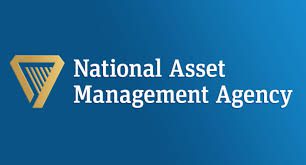 Nama made a profit of €102m for the first six months of this year, and has guided that it will complete its work by the end of 2017 or mid-2018, according to its annual statement, published yesterday. This was almost double the €55 million surplus achieved in the same period of 2013. The report shows that Nama’s cash generation accelerated in the six-month period, generating cash of €5.4 billion during the first half of this year compared with €2 billion in the same period of 2013.
Nama made a profit of €102m for the first six months of this year, and has guided that it will complete its work by the end of 2017 or mid-2018, according to its annual statement, published yesterday. This was almost double the €55 million surplus achieved in the same period of 2013. The report shows that Nama’s cash generation accelerated in the six-month period, generating cash of €5.4 billion during the first half of this year compared with €2 billion in the same period of 2013.
NAMA is also focusing on the completion of a number of residential properties in London in 2015 and 2016, while it is also planning and facilitating the delivery of office accommodation in Dublin with a special focus on the city’s Docklands Strategic Development Zone. The agency has committed to ensuring that a pipeline of large portfolios of mainly Irish property assets will be put up for sale, adding that packaged deals for properties with a minimum value of 250m will be offered for sale every four months.
A report, which has been commissioned by the Society of Chartered Surveyors Ireland (SCSI), explores the capacity of lands zoned for residential development within the Dublin Region to deliver the requisite housing units for the projected population of the Dublin Region between 2014-2018.
The key findings in the report are:
 The Society of Chartered Surveyors of Ireland (SCSI) has called for an extension of Home Renovation Scheme (HRI) to Commercial Properties following a survey which was carried out. SCSI has called for a number of measures to boost the supply of new commercial property, including the introduction of a Builders Finance Fund (BFF) and a Revolving Infrastructure Fund to support the availability of development finance.
The Society of Chartered Surveyors of Ireland (SCSI) has called for an extension of Home Renovation Scheme (HRI) to Commercial Properties following a survey which was carried out. SCSI has called for a number of measures to boost the supply of new commercial property, including the introduction of a Builders Finance Fund (BFF) and a Revolving Infrastructure Fund to support the availability of development finance.
The survey also shows a 5th of commercial property owners applied for a rent reduction in the last year, of those that applied 42% achieved a reduction of up to 10%.
Please see PDF report:
New Commercial Property Survey from Society of Chartered Surveyors Ireland
KPMG has repackaged all €2.4bn unsold IBRC non-performing loans (NPL) in three separate portfolios, dubbed projects Amber, Quartz and Pearl, in a set of fresh blind auction processes which are targeted for staggered closures before the year end.
PricewaterhouseCoopers has been assigned to advise KPMG, the joint special liquidator of IBRC, on the re-attempted sale of the loans which failed to meet the minimum price threshold as set by Ireland’s Minster of Finance, Michael Noonan in May last year.
The re-packaged NPLs are now comprised as follows:
– The €675m Project Amber, comprised of Irish corporate and commercial property loans
– The €1.1bn Project Quartz, comprised of commercial property loans
– The €655m Project Pearl, comprised of predominantly Irish residential mortgages.
Project Amber is the first of the three re-issued NPLs to be marketed, with the sales process having started last week, according to the Irish Independent. The sales process for Projects Quartz and Pearl are expected to begin next month.
A successful sale of projects Amber, Quartz and Pearl would facilitate the completion of IBRC’s accelerated wind-up, as decreed by Ireland’s parliament in early February 2013 after emergency overnight legislation was passed in the Dáil, Ireland’s parliament, and KPMG’s Wallace and Richardson replaced IBRC’s Board.
During the first half of the year the investment in Ireland’s commercial real estate (CRE) market has totalled €1.8bn year-to-date, Dublin’s office market accounted for 70% of all capital invested in Ireland in H1 2014 and the changing risk premium for Dublin offices has enticed investor groups into the market for the first time, notably UK open-ended fund Knight Frank Investment Managers.
Crucially, the requisite economic and real estate fundamentals to support these factors have been in place. Rising rents are a clear manifestation of the improvements. Office rents are up 15% since the start of the year, and there are now signs of rental growth in segments of the retail and industrial sectors.
Please view full report:
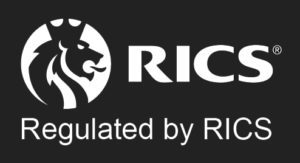


Hambleden House
19-26 Pembroke Street Lower
Dublin 2
D02 WV96
Ireland
»Map
Phone: +353 (1) 6477900
Fax: +353 (1) 6477901
Email: info@bannon.ie

| Title | Price | Status | Type | Area | Purpose | Bedrooms | Bathrooms |
|---|
